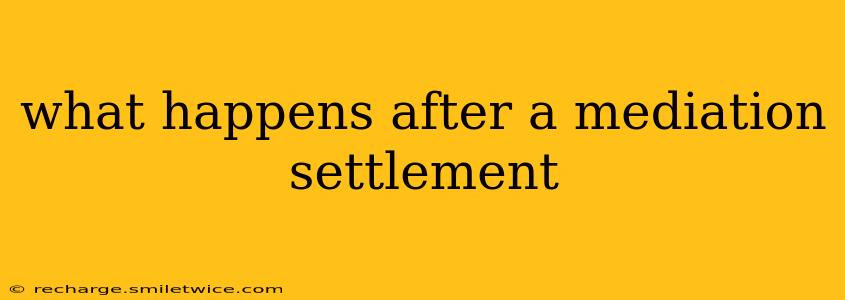Mediation offers a powerful alternative to lengthy and costly court battles. Successfully reaching a settlement during mediation is a significant achievement, but the process isn't over once you shake hands. Understanding what happens after a mediation settlement is crucial to ensuring the agreement is legally binding and effectively implemented. This guide will walk you through the post-mediation steps, answering common questions and providing valuable insights.
What Happens to the Agreement After Mediation?
After reaching a settlement, the agreement needs to be formalized. This typically involves:
-
Documenting the Agreement: The mediator, or your respective attorneys, will create a written document outlining all the agreed-upon terms. This document should be detailed and unambiguous, leaving no room for misinterpretation. It's crucial to carefully review this document before signing. Any changes or clarifications should be made before signing.
-
Signatures: Both parties (and their legal representatives, if applicable) must sign the agreement to make it legally binding.
-
Enforcement: The agreement, once signed, becomes a legally enforceable contract. If one party breaches the agreement, the other party can seek legal remedies to enforce the terms. This might involve returning to court to compel compliance or seeking damages for breach of contract.
What If I Change My Mind After the Mediation Settlement?
Regretting a mediation settlement is possible, though the chances of successfully undoing the agreement are slim. The agreement is legally binding once signed. To challenge it, you’d need to demonstrate:
-
Lack of Capacity: You were legally incapable of entering into a contract (e.g., due to intoxication, duress, or mental incapacity). This is a high bar to clear and requires strong evidence.
-
Misrepresentation or Fraud: You were induced to sign the agreement through deceit or false information presented by the other party. This also necessitates substantial proof.
-
Undue Influence: You were pressured into accepting a settlement that wasn't in your best interests due to an imbalance of power or unfair coercion.
How is the Mediation Settlement Enforced?
The method of enforcement depends on the specifics of the agreement and the nature of the dispute. Generally:
-
Specific Performance: The court might order a party to fulfill their obligations as outlined in the agreement.
-
Monetary Damages: If the breach involved financial losses, the court can award monetary compensation to the injured party.
-
Contempt of Court: In cases of willful disregard of the agreement, a party might face contempt charges, leading to fines or even imprisonment.
What Happens if One Party Doesn't Follow the Settlement Agreement?
If a party breaches the settlement agreement, the other party can take legal action to enforce the terms. This usually involves filing a motion with the court to enforce the agreement or initiating a breach of contract lawsuit. This process can involve:
-
Court Hearings: Presentations of evidence to demonstrate a breach.
-
Legal Fees: Significant legal costs associated with pursuing enforcement.
-
Potential Penalties: Financial penalties imposed on the breaching party.
How Long Does it Take to Finalize a Mediation Settlement?
The timeframe for finalizing a mediation settlement varies significantly depending on the complexity of the agreement and the parties involved. Simple agreements may be finalized within a few weeks, while more complex settlements could take several months.
Can I Get Legal Advice After a Mediation Settlement?
Absolutely. Even after reaching a settlement, seeking legal counsel is highly advisable. An attorney can review the agreement to ensure it protects your interests and advise you on the next steps if any issues arise.
This guide provides a general overview. The specifics will vary based on the jurisdiction and the circumstances of your case. Always consult with a legal professional for personalized advice concerning your specific situation and settlement agreement.
